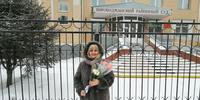Case of Kaganovich in Birobidzhan
Filter
- #
The Investigative Department of the Federal Security Service of Russia for the Jewish Autonomous Region is initiating a criminal case for faith under Article 282.2 (2) against 53-year-old Yuliya Kaganovich. According to the investigation, she "committed deliberate actions related to the resumption and continuation of the activities of the local religious organization of Jehovah's Witnesses in the city of Birobidzhan."
- #
The criminal case against Yuliya Kaganovich is transferred to the Birobidzhan District Court of the Jewish Autonomous Region.
- #
The Birobidzhan District Court of the Jewish Autonomous Region begins a preliminary hearing against the believer Yulia Kaganovich. The case is being considered by judge Vladimir Mikhalev.
- #
The judge suspends the criminal proceedings for 5 months due to the impossibility of Yuliya Kaganovich to participate in court due to the coronavirus pandemic.
- #
The preliminary hearing was postponed due to Yulia Kaganovich's illness.
- #
Referee: Vladimir Mikhalev. Birobidzhan District Court of the Jewish Autonomous Region (Birobidzhan, Pionerskaya St., 32).
- #
After a 9-month break, a preliminary hearing in the case of Yulia Kaganovich is being held in the Birobidzhan District Court of the Jewish Autonomous Region. Judge Vladimir Mikhalev does not accept the defendant's refusal of the appointed lawyer due to Yulia's lack of legal education. He also rejects several of her requests, including the return of the criminal case to the prosecutor and the inclusion of the Opinion of the UN Working Group on Arbitrary Detention. Yulia also asks to exclude the search report from the evidence and return the seized Bibles to her, which she refuses.
The defendant asks to postpone the hearing due to her state of health, as the doctor recommended that she observe self-isolation.
- #
The judge grants the request to postpone the hearing due to the coronavirus pandemic, but does not satisfy the believer's refusal of the services of a lawyer by appointment.
The prosecutor announces the charges, claiming that Yulia Kaganovich, "being aware of the public danger and the unlawful nature of her actions," read and discussed the Bible during religious meetings with fellow believers. The believer herself, expressing her attitude to the accusation, calls it unfair and resolutely rejects the accusations of extremism.
- #
Judge Vladimir Mikhalev granted the prosecutor's request to listen to the recordings of telephone conversations. Yulia Kaganovich draws the court's attention to the fact that the materials considered at the hearings have nothing to do with her, or with the charges, or with the alleged episodes. For example, the prosecution presents conversations of believers on spiritual topics, discussion of work schedules and leisure activities as evidence of the defendant's participation in extremist activities.
- #
Despite Yulia Kaganovich's objections, the Birobidzhan District Court is considering materials and audio recordings that are not related to her case for the fourth time. The prosecutor does not comment on the audio recordings listened to, but explains that the main assessment of the evidence will be given in the debate. The defendant believes that, according to Article 252 of the Code of Criminal Procedure of the Russian Federation, the prosecutor does not provide the court with concrete evidence of her guilt. According to the defense, the prosecution is delaying the trial.
Judge Vladimir Mikhalev informs the parties that he will retire in February 2020. In this regard, he plans to end the stage of the judicial investigation on February 17, namely the interrogation of a defense witness, the debate of the parties, during which the prosecutor will announce what punishment he recommends for Yulia Kaganovich, as well as the defendant's speech with the last word. On February 18, the judge plans to announce the verdict.
At the next hearing, it is planned to consider the evidence of the defense.
- #
Yulia Kaganovich submits 2 petitions: on the inadmissibility of the testimony of the prosecution witness - police officer Zvereva; and inadmissible evidence that does not relate to the defendant.
The believer testifies and denies the accusations against her. Speaking about the fact that extremist actions, according to the law, are impossible without the motive of hatred or enmity, Yulia Kaganovich tells the court about the peace-loving nature of her faith. She also draws attention to the lack of evidence in the case file that she carried out any illegal actions: "Neither the court nor the law recognized the religion of Jehovah's Witnesses as illegal. The religious beliefs and corresponding practices of Jehovah's Witnesses were both legal before 2017 and continue to be legal."
A witness for the defense, the spouse of the defendant, speaks. He says that during 30 years of happy family life, Yulia has always been a reliable rear for him and a good mother for their son. "We have many friends of different religions," he continues. "And I myself do not share my wife's religious views, but we find a great common language." When asked if he has ever heard calls for illegal actions from Yulia, the witness replies: "No, of course not. How can such a person of a broad soul and kindness call for some illegal actions, why does she need it?
- #
The prosecutor shall read out the testimony of the prosecution witness. The defendant objects, since the testimony of the witness does not relate to the imputed event and, according to the examination, on the specified date there was a friendly meeting, and not a religious one.
During the debate, the prosecutor recommends a sentence of imprisonment for a period of 4 years in a colony and 2 years of restrictions. He asks to be taken into custody in the courtroom.
Yulia Kaganovich speaks with the last word: "Your honor, by reviewing the case materials and videos, you had the opportunity to make sure that Jehovah's Witnesses learn kindness and love at their meetings. They sing songs that glorify God, read the Bible, and discuss how to apply Bible knowledge in their lives. All of these are legitimate religious practices of Jehovah's Witnesses. Everything is decent, there is not even a hint of extremist actions. [...] We are helped by Christian meetings. Through them we learn to love God and continue to do His will. Love each other. Deepen your understanding of God's laws and apply them in your life." Further, she reminds the court that the case file contains letters of thanks and documents characterizing her personality: "In the psychological and psychiatric examination commissioned by the FSB, it is written about me as follows: 'The most pronounced features are empathy with other people, responsiveness, soft-heartedness, rejoicing in other people's successes.' Can a person with such qualities have anything to do with extremism? It's just not possible!"
Yulia explains the fallacy of applying the law on extremism to Jehovah's Witnesses: "The FSB investigator has repeatedly stated that if you want to believe, believe within yourself and stay at home. Is this a new law? Where can this law be deducted? Or do we have a new constitution? The prosecution erroneously applies the law on extremism to Jehovah's Witnesses. Misinterprets the decisions of the courts... Now I can't meet my friends, read the Bible and learn good things? If this is evil, then what is good? Doesn't our state need respectable people who live according to their conscience and observe the laws of the country? There is a clear persecution for the faith."
In conclusion, addressing the court, the defendant says: "Your Honor, I want to say that there are still victims. It is against me that actions are being taken on the grounds of religious hatred. My rights have been violated. The Federal Security Service... denigrated my reputation, the reputation of my family, and exposed my religious beliefs as criminal. For more than two and a half years, I have been labeled as a criminal. On the Rosfinmonitoring website, I am an "active extremist terrorist". It doesn't fit in my head ... My family and I went through a profound upheaval."
The court announces the verdict: guilty under Part 2 of Article 282.2 of the Criminal Code of the Russian Federation. To sentence Yuliya Kaganovich to a fine of 10,000 rubles with a 5-month installment payment. The verdict has not entered into force and can be appealed.
The last word of the defendant Yulia Kaganovich in Birobidzhan - #
Prosecutor A. A. Vyalkov will appeal against the verdict of the Birobidzhan District Court against Yulia Kaganovich. He believes that the punishment in the form of a fine of 10 thousand rubles is excessively lenient and does not correspond to the "degree of public danger of the crime."
The state prosecutor continues to insist on a strict punishment - 4 years of imprisonment in a penal colony of general regime, followed by restriction of freedom for a period of 2 years. Vyalkov demands that the believer be taken into custody in the courtroom.
- #
The court of the Jewish Autonomous Region satisfies the prosecutor's complaint and imposes a 2.5-year suspended sentence with restriction of liberty for 1 year.
- #
The Ninth Court of Cassation of General Jurisdiction in Vladivostok approves the appeal decision in the case of Yulia Kaganovich.
- #
Judge of the Birobidzhan District Court Natalia Sheremetyeva cancels the suspended sentence of Yulia Kaganovich ahead of schedule and removes her criminal record. The Court takes into account that the believer served half of her probationary period and did not commit any violations during this time.

